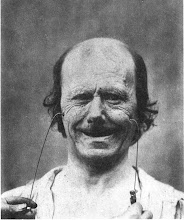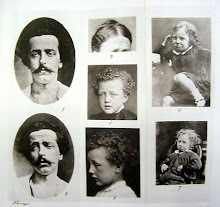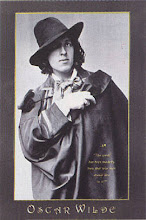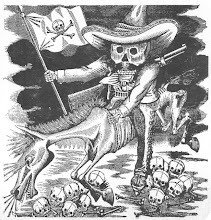Saturday, November 8, 2008
Election tropes
Friday, November 7, 2008
Election schemes
Finally the election is over--a fair field full of fury. (alliteration).
The Republicans now suffer, but we also rejoice in our sufferings, because we know that suffering produces perseverance; perseverance, character; and character, hope. And hope does not disappoint us. (anadiplosis).
And now for some fairness in society: I say, don't hold back. Strike as I would. Have struck those tyrants! Strike deep as my curse! Strike! and but once (anaphora).
How the last eight years have seemed to me: The helmsman steered; the ship moved on; yet never a breeze up blew. (anastrophe).
All those who are merciful with the cruel will come to be cruel to the merciful. (antimetabole).
Response to paliniacs: Not that I loved Caesar less', but that I loved Rome more. (antithesis).
Now they seek That solitude which suits abstruser musings. (assonance).
We must... hold them, as we hold the rest of mankind, Enemies in War, in Peace Friends. (asyndeton, chiamus)
May we find all of this Republicanism ...Lost, vaded, broken, dead within an hour. (climax- the noun, not the verb).
Republicans leaving DC: What is Hecuba to him, or he to Hecuba? (epanalepsis).
Where affections bear rule, there reason is subdued, honesty is subdued, good will is subdued, and all things else that withstand evil, for ever are subdued. (epistrophe).
To the rovians and paliniacs: Bloody thou art; bloody will be thy end. (hyperbaton).
And the louder they talked of their honor, the faster we counted our spoons. (isocolon).
When you are right you cannot be too radical; when you are wrong, you cannot be too conservative. (parallelism).
I’ve had to resist and to attack sometimes – that’s only one way of resisting – without counting the exact cost, according to the demands of such sort of life as I had blundered into. (parenthesis)
I spent several days and nights in early November with an ailing pig and I feel driven to account for this stretch of time more particularly since the pig died at last, and I lived, and things might easily have gone the other way round and none left to do the accounting. (polysendeton).
Tuesday, November 4, 2008
American Death Penalty-Part 1
Once upon a time, even before the United States was a country, we had a death penalty. To some extent it existed in the northern colonies to punish religious heretics and witches and the like, but for the most part it was in the southern colonies to help enforce slavery. Many things related to slavery were capital crimes including helping slaves escape and inciting slaves to run away. Even to this day, the slave states are where we find most of the executions.
The English Bill of Rights in 1691 had prohibited cruel and unusual punishment and then the Eighth Amendment was adopted in 1791 saying about the same thing. This was not meant to end the death penalty though, but only torture before causing death. Also, although states had their own prohibitions against cruel or unusual punishment, this part of the Eighth Amendment did not originally apply to the states. The Supreme Court in In Re Kemmler in 1889 rejected an argument that the 8th Amendment applied to the New York when this state started electrocuting people to kill them.
Finally, in the case of Robinson v. California in 1962 the prohibition against cruel and unusual punishment was applied to the states, but this was not a death penalty case, but prohibited imprisoning Mr. Robinson just because he was a drug addict and had needle tracks in his arms. But we get ahead of the story.
The historical link between slavery and the death penalty held sway as the northern states moved into a period of reforming the death penalty before the civil war. The southern states saw a need to discipline a captive workforce and had no similar reform movement. The racist purpose for capital punishment was openly discussed. This situation became a national embarrassment when the racism in using the death penalty became an international incident when the Scottsboro Boys were sentenced to death. When the seven young black men accused of rape were given the death penalty, essentially without lawyers and with little evidence, the nature of the American death penalty was given an international stage. The Supreme Court in 1932 decided the case of Powell v. Alabama. There were many glaring problems with the sentence, but the court found a way to correct the embarrassment of this one case without greatly impacting the system of using the threat of death to control an oppressed caste. The Court did not say a capital defendant should always have a lawyer, but that in a capital case where the defendant is unable to employ counsel and is incapable of adequately making his own defense because of ignorance, feeble-mindedness, illiteracy or the like, he should get a lawyer.
Sunday, October 26, 2008
Grief

I have dream conversations with the dead. This afternoon as I slept, it was with Joe, now dead for eight years. It was as real as if he had been sitting across the table from me, dominoes in play.
Sunday, October 19, 2008
How many dead?

Sunday, October 12, 2008
Democrats and the Invisible Hand

Wealth … is like a snake; it will twist around the hand and bite unless one
knows how to use it properly. – Clement of Alexandria, “The Instructor,” 3.6.34
The odds makers only give one chance in four for a 60 seat working majority, so we are not likely to face this prospect. If it happened, would the Democrats take the opportunity and make major changes in government?
Jimmy Carter had a 60 vote majority to work with and did little with it. Clinton never had the majority, but he was determined to disappoint in any case.
Still, I will do my small part. I'll vote for Obama although the electoral college pretty well assures it is a futile vote in Texas. I'll vote for Noriega. I'll vote for Solomon. But I know we need something bigger.
What I want from the Democrats is an escape from the profit-motive, the afan de lucre, that I believe wrecks human relations and corrupts society.
American politics suffers the grip of the invisible hand about the throat. I've several times tried to wade through Wealth of Nations and I still regard Adam Smith warmly. I do believe the Butcher, the Baker and the Brewer provide benefit to one another by acting out of self interest, but, profit, as a religion, has done a great disservice to Adam Smith. Adam Smith would be shocked by the misuse of his work today, just like Jesus would be shocked by what passes for Christianity.
I do not acknowledge that greed is the best glue to bind society.
"Don't you believe in profit?" Or, "what's wrong with making a profit?" is now the universal conversation stopper. When the war profiteer or the storm price gouger or (most recently) the CEO who has just shut down his company with a golden parachute gets caught, he says pompously, "You do believe in profit, don't you?"
My answer is "No." Profit is nothing more than unjustly withheld wages. Or over-charged clients. Or cheated vendors.
How might we escape this invisible hand? I don't think we can change human nature. But I do believe we can recognize greed for what it is. It is not a virtue; it is a sin.
Saturday, October 11, 2008
Texas 45 Oklahoma 35

When I called today to see if Randall had offed himself, he told me the Texas-Oklahoma game was on. This coincided nicely with my desire for a meal, so I walked over to the Palm Lounge.
Sunday, October 5, 2008
Bailout

I have not read the three page version, much less the 450 page version, nor am likely to do so. Nevertheless, I'm going to take a position against it. The only candidate I can find who opposes the bill who I can vote for is Noriega, but I would have voted for him anyway. Cornyn, Hutchinson, McCain and Obama all voted for the bill.
Solomon Ortiz first voted against the Bailout and then voted for it. Four who voted against the Bailout in the final version were Dennis Kucinich, Bernie Sanders, Lloyd Doggett and Russ Feingold.
On this issue, I trust Kucinich, Sanders, Doggett and Feingold more than I do McCain, Obama, Clinton, Cornyn and Ortiz.
I have been receiving e-mails telling me the Bailout is Marxist and socialist. However, all my socialist blogs and magazines are against it. Acorn and Jesse Jackson are against it. My question is, if it is socialism, why is the only socialist in Congress, Sanders, against it? Why is the Socialist Worker against it? Why are all the crypto-socialists against it?
So I join the Republican Congressmen and Uncle Tiger in opposing the Bailout bill. It's too late now, of course, we have lost. But this issue will raise it's head again.
I am as afraid of depression, soup kitchens and bread lines as anyone. The problem is, on this issue, I don't trust our party leaders, Democrat or Republican.
Sunday, September 21, 2008
Will President Obama End the War?

Monday, September 15, 2008
Ed Talks Money Management

Saturday, September 6, 2008
Sarah Palin--We've Done Worse

I like this Sarah Palin choice. Of course, I won't vote for her. After all, she has confessed publicly to being a Republican. But that aside, she rests well with me.
The Bundlers and Predicting Presidential Elections
Sunday, August 17, 2008
In Praise of Idleness
Wednesday, August 13, 2008
Siesta
My Grandpa Casebier climbed down from his tractor and took a nap every day. Grandma Casebier called him lazy for the sixty-plus years he did so.
In the early 80's, I tried a workers' compensation case in front of an elderly judge who broke each day at noon. Now it is true the "two day trial" lasted a week, but I still think the quality of justice was higher than usual. My opposing counsel was not rested; he complained all week and drove an hour back to his office to work the rest of the day. I took a nap and a swim and read over the work for the next day. I recommend this approach to the judiciary; most of the rest of the week after a two day trial is needed for recovery anyway.
I love nap stories. When George McGovern called LBJ to ask Johnson for advice in his campaign for the presidency after McGovern won the democratic nomination, Johnson told him to take nap in his pajama's every day.
I was discussing naps with Dan Boyd today. (We once were young enough we talked about girls, then politics, then law and now naps-are these the passages in life?). Dan relates John Kenneth Galbraith nap stories. Galbraith who died at 97 took daily naps, even during busy periods such as when he was John Kennedy' ambassador to India. President Lyndon Johnson called Galbraith during a nap and Galbreath's housekeeper refused to interrupt his nap.
So do naps help you live longer? I don't know, but I like this quote:
The recent study following nearly 24,000 people for on average 6 years found that those who regularly took midday naps were nearly 40% less likely to die from heart disease than non-nappers. Researchers suggested siestas might protect the heart by reducing stress hormones levels. They found "people who took at least three naps per week lasting 30 minutes or longer had a 37% reduced risk of death from heart disease than their non-napping counterparts. Those subjects who occasionally took short naps lasting less than half an hour had a 12% lower risk than people who never napped... The results suggest that taking naps might be
just as important to protecting the heart as other measures, he says, including eating right and taking cholesterol-lowering drugs... http://ajpendo.physiology.org/cgi/content/full/292/1/E253
My friend Paul, the Lebanese Arabic Scholar, regularly slips away for his naps. He seems to me one of the saner guys in either courthouse.
Apparently there is some contrary evidence. Retirees who sleep a lot during the day don't seem to do very well.
But over all, nappers appear to be more productive, healthier, happier and longer lived than non-nappers. Of course there is a difference between causation and correlation. It may be that people who are productive and happy, give themselves a break and take a nap. It may be that those who work in the meat packing plants and field labor and other hazardous jobs don't get a chance to nap.
What is the downside to spending all that time napping? I hear plenty of anecdotes about super-achievers who slept three hours a night for a lifetime and used every waking hour to do things like cure cancer, write the great American novel or win the Nobel Peace Prize. Maybe so.
My sense, though, is that no normal lifespan is really long enough to accomplish much. Certainly, not without extraordinary skills (I may have some, but they have not yet surfaced in the first 57 years). So, barring the tyranny of man or circumstance, I'll be napping every day at about 3 pm.
Monday, August 11, 2008
State Subsidized Usury and the End of the Republic
Sunday, August 10, 2008
Can there every really be a Chigurh?
Ed Tom Bell: I'm not sure he's a lunatic.
El Paso Sheriff: Yea well what would you call him?
Ed Tom Bell: Well, sometimes I think he's pretty much a ghost.
Saturday, August 9, 2008
Free Will and Determinism
Mark raised the issue of Free Will and my initial response was to agree with him that there is none. Of course, as is my wont, pondering the question, I have waivered back and forth a dozen times. I can't decide if I have the power to decide if I have free will. Oh well.
I first resolved this issue in my mind in high school. I read Skinner's Walden Two and was persuaded that we become what we are because of heredity and environment.
I think I have been especially tolerant of other's foibles as a result of this view, but I am open to the possibility that I wanted to set the bar low for forgiveness for my own foibles. In this case, the philosophy would have followed the personal need, which of course would say less about the truth of the philosophy than the nature of the believer.
Other beliefs I have held, though at some times to me the pellucid truth at other times seem only a convenient justification for my shortcomings. I have often doubted the existence of hell, but was this because I could not face the prospects of finding myself there? I have long had socialistic tendencies, but has this arisen because of a suspicion that I have no knack for making money?
Anyway, determinism (at least by heredity and environment) has had its appeal for me. It helped me love people I was supposed to love although they were severely damaged human beings. It let me off the hook on my own damage.
My problem with determinism of the heredity and environment type is it appears to have lot in common with determinism of the Calvanistic, God has chosen us but not you people, type.
The Catechism of the Catholic Church endorses free will:
1704 The human person participates in the light and power of the divine Spirit. By his reason, he is capable of understanding the order of things established by the Creator. By free will, he is capable of directing himself toward his true good. He finds his perfection "in seeking and loving what is true and good."7
But the teaching of the Church seem to be more complex than this. As I recall my muddled reading of Augustine, he rejected free will. And I have previously written about Pascal's dispute with the Jesuits in which Pascal defends something very much like determinism.
Lord, why have you not blessed me with the environment and heredity to give me a better mind to figure this out? Or even prearranged environment and heredity would keep my friends who understand this better than I do alive and healthy and nearby, so they can explain it to me?
Mark Bennett says,
I’d like to congratulate the lawyers who prosecute, and the judges who sentence them, for the “choices” that they’ve made that put them at the top and my clients at the bottom. . . . and, for that matter, anyone else who is smugly self-righteous about his lot in life.
Generally, he views the determinists as tolerant and the free will crowd as intolerant. I'm not sure this is true. Even winning the argument that heredity and environment has put us where we are, what is to keep the winners in society from fighting to hold that position?
Tuesday, July 15, 2008
Wireless Brownsville
This is a 15 square mile grid and cost $3 million to set up. Brownsville is more than 80 square miles so, the project would not be as simple.
Many big cities like San Francisco and Philadelphia had similar wireless plans, but the projects have run into trouble when the service provider EarthLink reneged on the deal.
Some areas such as NYC have aimed more at providing wireless parks and public buildings.
I don't know whether any of this is feasible for Brownsville, but it would seem the potential would be great.
Providing greater access to computers would be nice also. What would it cost to give a laptop to every 6th grader? I recall Newt Gingrich had a similar plan, so this is not just my personal weirdness. (Though it may be a shared weirdness--sort of a Folie a Deux for politicos.)
I have heard about the $100 laptop plan for poor areas. We should qualify. Even without that computers have gotten less and less expensive. I am typing this on a $300 computer called ASUS eee. It is cheap because it dodges Microsoft by using the Linux operating system (which I prefer).
I think of the flowering that Brownsville kids had when JJ Guajardo and others decided to teach them chess. All of a sudden, Russell Elementary kids being raised without the benefits of Suburbans, summer camps and math clinics were on a level with the top students in the most expensive schools in the country.
Monday, July 14, 2008
Hillary for VP
Dr. K thought Obama would pick Caroline Kennedy or a Republican Chuck Hagel so he was surprised. I thought ultimately Obama would pick Hillary so I felt vindicated. But now it appears my gloating was premature. However, I still think she should be chosen.
I am not a big fan of Hillary's and did not vote for her in the primary, but I think she would be a good choice for several reasons. First, it would be the democratic thing to do. She did after all get the second most votes. The Constitution originally gave the Vice Presidency to the second place winner, regardless of party, so this is not exactly a new concept. Second, she appears to have a base of support different from Obama's. I don't know why this is, really, but if it is so, it would be ticket balancing. I assume Obama will carry New York without Hillary, but I do know my wife, mother and sister all supported Obama and they would be happier with her on the ticket. Third, my wife, sister and mother all supported Hillary and I don't want to have to hear about it if Obama picks someone else and loses.
In the primaries, just 1.3 million Texans voted Republican compared to almost 2.9 million who voted Democrat. The Nation magazine has an article this week that makes the argument that Texas could turn blue. The enthusiasm shown by Hillary supporters, especially on issues like health insurance and mortgage relief, at the county convention make me think a Texas upset might be possible.
Sunday, July 6, 2008
Downtown Brownsville Without Cars
Wednesday, July 2, 2008
Kennedy v. Louisiana: I Agree 2 -- More Thoughts
Saturday, June 28, 2008
Kennedy v. Louisiana: I agree.
Thursday, June 26, 2008
Lynchings, Poverty and Executions
Thursday, June 5, 2008
Tricycling Brownsville
On the way back, somewhere along the way, the flag, you know, orange on a tall fiberglass pole, blew away.
Back on the ground in Brownsville, I raised the seat and tightened things up. Kathy insisted I ride around in the parking lot behind the house some before I ventured out. I also dug up an old bicycle cable with a lock on in that belongs to some long since stolen bicycle. I did fine in the parking lot so I ventured out into the larger world, humming the tune from Indiana Jones.
The first problem is car driving in downtown Brownsville is a blood sport and there are extra points for bicyclists. There was no way I could go on the busy streets. The next problem is that tricycles are wider than bicycles and it takes some calculation to make sure I didn't get stuck on a curb.
I soon discovered 8th Street, low traffic and a nice parking area halfway between the state and federal courthouses: a light pole perfect for locking up an adult tricycle. There wasn't a lot of other traffic.
This particular adult tricycle has a basket of a perfect size for my old beat-up leather briefcase.
However, there is the problem of sunburning the top of my bald pate. My usual straw fedora won't stay on with the blazing speed of an adult tricycle. I dug a gimme cap out of the closet that says "Relax" on the front and it seems to work.
The neighborhood kids are also out on their bikes and when I drive by they come out and join me for a couple of blocks. A half a dozen kids on bikes, one pulling another in a sort of bike trailer filled with yet another kid, cruising the wrong way down 8th street. It may appear to be an odd gathering, but outside of inmates, it has become the larger part of my contact with the world.
Jeff tells me this is a good green thing to do, but then he is much more hopeful about life. I just keep thinking how much money I could save if I could raise enough money to be able to afford to sell the car.
Wednesday, June 4, 2008
Pascal's First Three Provincial Letters
I dutifully hopped on the adult tricycle loaned to me by Jeff (the retired syphilis hunter) and peddled over to the Brownsville Public Library. There, the only Pascal available was volume 30 out of the Great Books publication. So I check it out and I also picked up both volumes of the Syntopicon for browsing.
Austin sneers at the reading of interpretations, histories, biographies, etc. from the classic writers, but with hard guys, I tend to read around them a while before I can get up the courage to actually read the book. Sometimes I only read around them and never get to the book.
Saturday, May 31, 2008
Doocing
doocing noun [U/C] /
“I started this website in February 2001. A year later I was fired from my job for
this website because I had written stories that included people in my workplace.
My advice to you is BE YE NOT SO STUPID. Never write about work on the
internet unless your boss knows and sanctions the fact that YOU ARE WRITING
ABOUT WORK ON THE INTERNET.”
Since Armstrong, there have been many notorious cases of people being dooced. Ellen Simonetti was fired from Delta airlines for some hardly racy photographs of herself in an flight attendant uniform in an airplane. Mark Jen was fired from Google for posting comparative pay benefits between Google and Microsoft. Jessica Cutler was a staff assistant from an Ohio Senator who was posting anonymously, but was outed and then fired after she described her ventures into prostitution to augment her meager staff pay.
At this stage there is very little protection for employees of private employers who are not careful and offend their bosses. The larger issues of defamation and disclosure of trade secrets are also being tested by the law. I am interested in the legal developments related to blogging and plan to do a few posts along these lines.
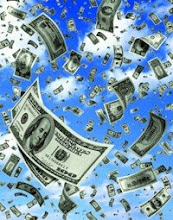
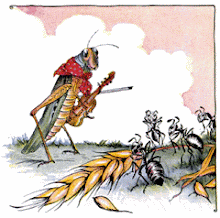














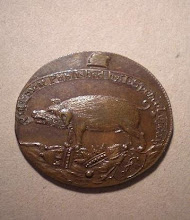









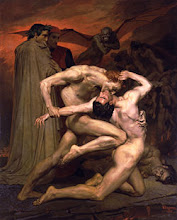_-_Dante_And_Virgil_In_Hell_(1850).jpg)















